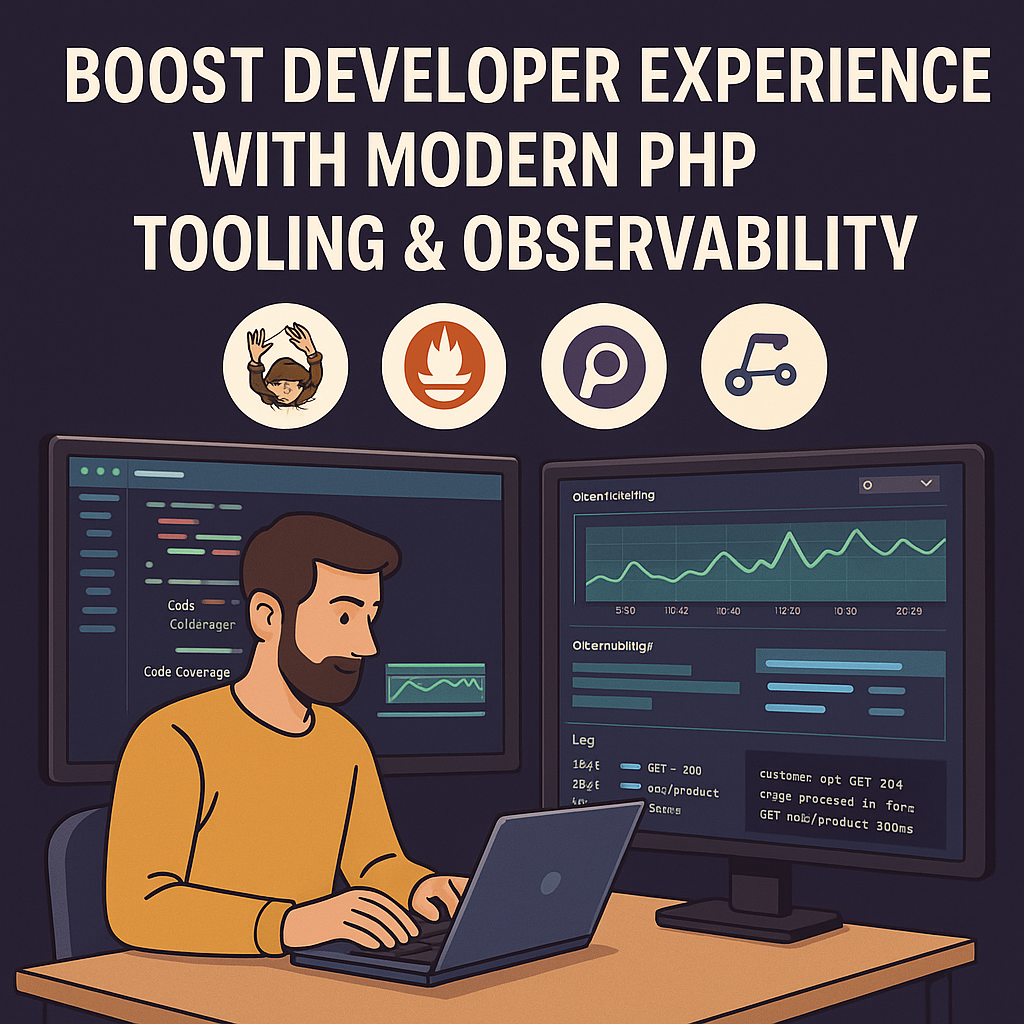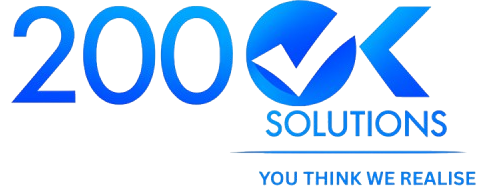
PHP has come a long way. Today, it offers modern tools that make development smoother and systems more visible. In this article, we’ll dive into why PHP tooling and observability matter, and how they boost productivity and confidence.
What Is Developer Experience in PHP?
The term developer experience refers to how easy and fun it feels to code, test, and deliver software. Good PHP tools simplify workflows, reduce errors, and save time.
Think of it like cooking with a sharp knife versus a dull one. The sharper tool feels better in your hand, works faster, and keeps you motivated. Similarly, modern PHP tools sharpen your coding experience.
Core Benefits of Modern PHP Tooling
1. Clean and Reliable Code
Tools like PHPStan, Psalm, and PHP_CodeSniffer help catch mistakes before runtime. They check types, coding style, and syntax.
With these, you spot bugs early. This increases confidence in your code.
2. Fast Workflows
Tools like Composer, Pest, PHPUnit, Pint, and Symfony Flex streamline tasks. You install libraries, run tests, and format code in seconds.
With automation, you do you, not repetitive tasks.
3. Better Collaboration
When everyone uses the same tools and standards, the team works together smoothly. Practices become shared habits.
This consistency matters across teams and time zones.
What Is Observability in the PHP World?
Observability means you can see what your app is doing in real time. It tracks logs, metrics, and traces. This tells you how healthy the system is.
Monitoring tools like Prometheus, Grafana, New Relic, Elastic APM, and OpenTelemetry show what’s happening under the hood.
It’s like driving with a dashboard—speed, fuel, engine life—so you know when something needs attention.
Getting Started with PHP Tooling
Let’s explore essential tools for developers:
1. Composer
This is PHP’s package manager. It downloads libraries, handles dependencies, and updates packages.
Use it like this:
composer require phpunit/phpunit --dev
composer update2. Static Analysis
Run tools like this:
composer require --dev phpstan/phpstan
vendor/bin/phpstan analyse srcThese catch bugs before they hit production.
3. Testing
Install and run:
composer require --dev phpunit/phpunit
vendor/bin/phpunitWrite tests in a friendly format. Tests help prevent unexpected bugs.
4. Code Formatting
Use tools like Pint or PHP_CodeSniffer:
composer require --dev laravel/pint
vendor/bin/pintBoosting Observability in PHP Apps
Observability gives you eyes into your systems. Here’s how to add it:
1. Logs
PHP Monolog is the standard. Combine it with tools like Logstash or ElasticSearch to search your logs.
2. Metrics
Use Prometheus client to track values like request rate, memory usage, or error count.
Then visualize metrics in Grafana dashboards.
3. Tracing
Add OpenTelemetry or Elastic APM to trace requests across services. See latency, errors, and where the app slows down.
Real-Life Example: E‑Commerce Store
Imagine a PHP‑powered online shop. It uses:
- Composer for dependencies,
- PHPStan and PHPUnit to guard code,
- Pint to format,
- Monolog for logging,
- Prometheus and Grafana for metrics,
- OpenTelemetry for distributed tracing.
When a customer complains about a slow checkout, the team checks:
- Metrics show slow ordering API.
- Tracing shows a third‑party payment call takes time.
- Logs reveal timeouts in payment gateway.
Best Practices in PHP Tooling & Observability
1. Automate Everything
Use CI/CD pipelines to run static analysis, tests, code format, and security scans on every commit.
That way, you catch issues before merging.
2. Make Observability a Priority
Instrument your app early. Add logs, metrics, and traces in dev. This way, you won’t miss important signals later.
3. Use Dashboards and Alerts
Set thresholds—CPU usage, error rate—and get alerts with tools like PagerDuty or Opsgenie. Teams respond fast.
4. Standardize Configurations
Use shared configs for tools. For example, linting rules go in version control so everyone uses the same setup.
5. Practice Mindful Logging
Log with intent. Don’t log everything. Add context: user ID, request ID, and errors. This helps with debugging.
Common Mistakes and How to Avoid Them
| Mistake | How to Avoid It |
| Skipping tooling setup | Automate static analysis and code format on pull requests |
| Logging too much | Log only what matters with context |
| Ignoring metrics | Track core business metrics early, like response time |
| Running production without tracing | Instrument with OpenTelemetry in staging |
| Forgetting team training | Run demo sessions on new tools and dashboards |
Tools, Strategies & Platforms Summary
- Composer – Dependency manager
- PHPStan / Psalm – Catch bugs early
- PHPUnit / Pest – Testing reliability
- Pint / PHP_CodeSniffer – Consistent code style
- Monolog – Structured logging
- Prometheus + Grafana – Metrics & dashboards
- OpenTelemetry – Distributed tracing
- New Relic / Elastic APM – Full app visibility
- CI/CD (GitHub Actions, GitLab CI, Jenkins) – Automated pipelines
Conclusion: The Developer Experience of Tomorrow
Modern PHP tooling and observability offer a better developer experience. They:
- Catch bugs before they cause problems
- Automate repetitive chores
- Give deep visibility into app behavior
- Enable fast fixes and confident releases
- Help teams collaborate smoothly
By using these tools, your team gets sharper, happier, and more productive. You deliver better apps with less stress. You avoid fire drills and sleepless nights.
Ready to Improve Your PHP Developer Experience?
Set up your PHP toolchain with automation and observability. Want help? Get in touch for a free assessment or workshop. Let’s make your workflows smooth, fast, and error-free.

